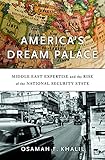America’s Dream Palace : Middle East Expertise and the Rise of the National Security State / Osamah F. Khalil.
Material type: TextPublisher: Cambridge, MA : Harvard University Press, [2016]Copyright date: ©2016Description: 1 online resource (380 p.) : 5 halftonesContent type:
TextPublisher: Cambridge, MA : Harvard University Press, [2016]Copyright date: ©2016Description: 1 online resource (380 p.) : 5 halftonesContent type: - 9780674974166
- online - DeGruyter
| Item type | Current library | Call number | URL | Status | Notes | Barcode | |
|---|---|---|---|---|---|---|---|
 eBook
eBook
|
Biblioteca "Angelicum" Pont. Univ. S.Tommaso d'Aquino Nuvola online | online - DeGruyter (Browse shelf(Opens below)) | Online access | Not for loan (Accesso limitato) | Accesso per gli utenti autorizzati / Access for authorized users | (dgr)9780674974166 |
Browsing Biblioteca "Angelicum" Pont. Univ. S.Tommaso d'Aquino shelves, Shelving location: Nuvola online Close shelf browser (Hides shelf browser)

|

|

|

|

|

|

|
||
| online - DeGruyter The Politics of Mourning : Death and Honor in Arlington National Cemetery / | online - DeGruyter Democracy : A Case Study / | online - DeGruyter Cycles of Invention and Discovery : Rethinking the Endless Frontier / | online - DeGruyter America’s Dream Palace : Middle East Expertise and the Rise of the National Security State / | online - DeGruyter The Triumph of Empire : The Roman World from Hadrian to Constantine / | online - DeGruyter Misreading Law, Misreading Democracy / | online - DeGruyter Antitrust Law in the New Economy : Google, Yelp, LIBOR, and the Control of Information / |
Frontmatter -- Contents -- Abbreviations -- Note on Translation and Transliteration -- Introduction -- 1. Private Knowledge -- 2. War time Expertise -- 3. A Time of National Emergency -- 4. America’s Sheet Anchors -- 5. (In)Visible Government -- 6. Modernizing the Middle East -- 7. Privatizing Knowledge -- 8. Empire and Its Limitations -- Epilogue -- Notes -- Bibliography -- Acknowledgments -- Index
restricted access online access with authorization star
http://purl.org/coar/access_right/c_16ec
In T. E. Lawrence’s classic memoir Seven Pillars of Wisdom, Lawrence of Arabia claimed that he inspired a “dream palace” of Arab nationalism. What he really inspired, however, was an American idea of the area now called the Middle East that has shaped U.S. interventions over the course of a century, with sometimes tragic consequences. America’s Dream Palace brings into sharp focus the ways U.S. foreign policy has shaped the emergence of expertise concerning this crucial, often turbulent, and misunderstood part of the world. America’s growing stature as a global power created a need for expert knowledge about different regions. When it came to the Middle East, the U.S. government was initially content to rely on Christian missionaries and Orientalist scholars. After World War II, however, as Washington’s national security establishment required professional expertise in Middle Eastern affairs, it began to cultivate a mutually beneficial relationship with academic institutions. Newly created programs at Harvard, Princeton, and other universities became integral to Washington’s policymaking in the region. The National Defense Education Act of 1958, which aligned America’s educational goals with Cold War security concerns, proved a boon for Middle Eastern studies. But charges of anti-Americanism within the academy soon strained this cozy relationship. Federal funding for area studies declined, while independent think tanks with ties to the government flourished. By the time the Bush administration declared its Global War on Terror, Osamah Khalil writes, think tanks that actively pursued agendas aligned with neoconservative goals were the drivers of America’s foreign policy.
Mode of access: Internet via World Wide Web.
In English.
Description based on online resource; title from PDF title page (publisher's Web site, viewed 01. Dez 2022)


